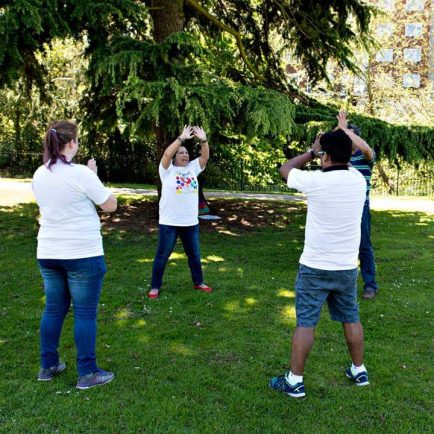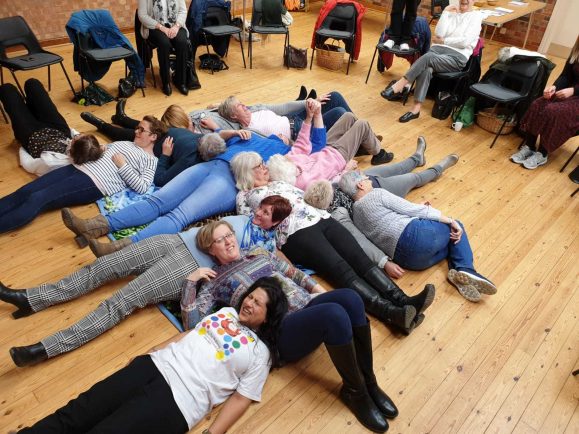LAUGHTER is the best medicine is a cliche many take for granted – myself included.
The idiom, thought to be of biblical origin, has been substantiated by scientists who discovered laughter could regulate hormones, reduce stress and boost immunity.
American journalist Norman Cousins prompted a string of scientific studies when he cured himself of a degenerative disease with funny movies coupled with high doses of vitamin C.
And doctor turned clown Patch Adams, who inspired a Hollywood biopic starring Robin Williams, turned to laughter to help heal his patients.
Both cases are said to be among those which inspired Indian laughter yoga founder Dr Madan Kataria whose impromptu ‘laughter club’, in a Mumbai park in 1995, took off all over the world.
The therapy not only eases tension but prompts the brain to release ‘feel good hormones’ – helping shed insecurities and connect more easily with others.
That said, when I turned up to the laughter yoga session at Leamington’s inaugural Eco Fest, I did not anticipate a frenzy of adults flapping around a tent like chickens.
While I wasn’t certain what to expect, it was more akin to a round of dad jokes while I assumed the ‘downward dog’ position (much more hilarious I felt).
I had hoped my partner would join me in my quest to reversing a lifetime of social conditioning; instead I went alone into the clucking crowd crutchless, attempting bogus laughter and feeling far from plucky.
Most others had their offspring in toe – which somehow made their laughter more justified. I found myself wishing I had borrowed my toddler nephew and pretend I only looked ridiculous for his benefit.
I floundered on the group’s perimeter feeling awkward about feeling awkward – like some social anxiety black hole sucking out every last iota of rationale.
But my reaction to one of humankind’s most primitive pleasures was ironic.
Positive psychology practitioner Janice Crompton Brough, who lead the session, explained not only did laughter trigger positive feelings but it was a natural way to bond with others, whether strangers or people we know.
She said: “It’s about acceptance and longing to fit in but what really helps is laughter because it’s what we have in common. It doesn’t matter how much my car is worth or what job I do; laughter is a great equaliser.
“It’s about moving away from the ego and being able to be like a child and regain that sense of connection rather than being on constant guard.”
Surprisingly, I found pretending to be a penguin one of the less excruciating exercises. Janice instructed us to huddle together, facing the same direction and to shriek.
Perhaps the closeness of the ‘waddle’ allowed me to feel more accepted into the group, and consequently less daft. Or perhaps it was because no-one could witness my penguin-faced conviction.
Other make believe scenarios included laughter while ‘brain flossing’ and then laughing into an imaginary mirror. Again the latter was more comfortable because I wasn’t forced to make eye contact with strangers – practically illegal unless you fancy someone.
Admirably, Janice was a ball of energy catapulting about the tent, yet a stark reminder of my own accustomed reserve.
The Warwick resident has been a practitioner for some eight years and embarked on her own laughter journey following a relationship breakdown.
Such life events, she said, were often reasons people turned to laughter yoga.
She explained: “Something we have in common is that we don’t tend to show our vulnerability. If you experience a loss and are in pain and suffering, society has kicked us into pretending we’re fine and so we put a face on. We block out being able to feel our feelings and then can’t let them go.
“Nowadays people are being encouraged to talk about mental health and to be comfortable with their vulnerabilities and weaknesses. The idea behind laughter is to access the emotions in the right hemisphere of our brain and train that inner critic to stop judging our emotions.
“Laughing is a form of mindfulness, a catharsis. It helps release emotions. When you get used to laughing with yourself it’s amazing what happens.”
One of the most surprising things I learned was the brain did not know the difference between fake and real laughter. One of the stress-busting components of laughter is its influence on your breathing pattern. The long exhalations help flush your lungs of stale air and free up space for all-important oxygen resulting in both mental and physical benefits.
So even if, like me, you find it hard to let go of your inhibitions, faking it whether you ‘make it’ or not can still have a positive impact on your mood.
Janice added: “Laughter triggers a physiological response even if it’s just from making the sounds. It can change the idea we need to wait to feel happy before we laugh, but we can laugh in order to feel happy.
“We should learn to put our ego down when it’s not not making us feel good. What it comes back to is you are a human being who can experience joy, laughter and creativity.”
Although I am not quite yet past the ‘faking it’ stage I am basking in my newfound pleasure in ‘laughing’ while stuck in traffic. I take a deep breath and let rip to my inner child’s content until I’ve used up every last bit of air. And I wonder if, maybe even hope, other drivers think I’m a bit mad.
It feels quite liberating.
Janice runs classes in Warwick and Stratford. Her next yoga laughter session is on June 9 at Foundation House in Stratford.
Search ‘Pu-Tai Wellbeing’ on Facebook for more details.















